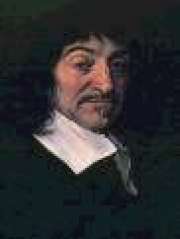|
Biografie René Descartes
René Descartes (1596-1650) is one of the most important Western philosophers of the past few centuries. During his lifetime, Descartes was just as famous as an original physicist, physiologist and mathematician. But it is as a highly original philosopher that he is most frequently read today. He attempted to restart philosophy in a fresh direction. For example, his philosophy refused to accept the Aristotelian and Scholastic traditions that had dominated philosophical thought throughout the Medieval period; it attempted to fully integrate philosophy with the 'new' sciences; and Descartes changed the relationship between philosophy and theology. Such new directions for philosophy made Descartes into a revolutionary figure.
The two most widely known of Descartes' philosophical ideas are those of a method of hyperbolic doubt, and the argument that, though he may doubt, he cannot doubt that he exists. The first of these comprises a key aspect of Descartes' philosophical method. As noted above, he refused to accept the authority of previous philosophers - but he also refused to accept the obviousness of his own senses. In the search for a foundation for philosophy, whatever could be doubted must be rejected. He resolves to trust only that which is clearly and distinctly seen to be beyond any doubt. In this manner, Descartes peels away the layers of beliefs and opinions that clouded his view of the truth. But, very little remains, only the simple fact of doubting itself, and the inescapable inference that something exists doubting, namely Descartes himself.
His next task is to reconstruct our knowledge piece by piece, such that at no stage is the possibility of doubt allowed to creep back in. In this manner, Descartes proves that he himself must have the basic characterisitc of thinking, and that this thinking thing (mind) is quite distinct from his body; the existence of a God; the existence and nature of the external world; and so on. What is important in this for Descartes is, first, that he is showing that knowledge is genuinely possible (and thus that sceptics must be mistaken), and, second, that, more particularly, a mathematically-based scientific knowledge of the material world is possible.
Descartes' work was influential, although his studies in physics and the other natural sciences much less so than his mathematical and philosophical work. Throughout the 17th and 18th Centuries, Descartes' philosophical ghost was always present: Locke, Hume, Leibniz and even Kant felt compelled to philosophical engage (often negatively, of course) with this philosophical giant. For these reasons, Descartes is often called the 'father' of modern philosophy.
1637 Discurs asupra metodei – contureaza criteriul adevarului
1641 Meditatii metafizice – în care a avansat principiul îndoielii metodice
1644 Principiile filosofiei
1649 Tratat despre pasiunile sufletului – conceptia morala; maxima morala: “Este suficient sa judecam corect pentru a putea actiona bine”
|





